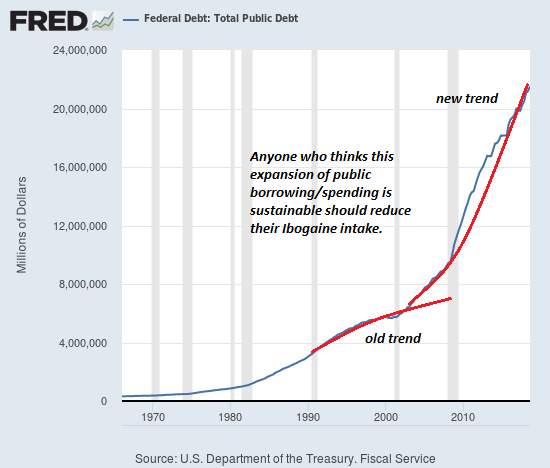The cause of the recession of 2019-21 is exhaustion: exhaustion of the pell-mell expansion of credit (i.e. credit exhaustion/saturation), exhaustion in the household and small business sectors as real-world price increases continue exceeding wage and revenue gains, exhaustion of margin expansion in stocks, and exhaustion of Corporate America's policy of masking inflation by reducing quality and quantity: at some point, the toilet paper roll is so visibly diminished (i.e. stealth inflation) that companies can no longer reduce the quantity: at that point, they must raise prices to remain profitable, and this explains the recent surge in the sticker price of consumer staples.
Conventional economics has no answer for exhaustion: the only "solution" in a Keynesian universe is to goose borrowing by lowering interest rates and sluicing limitless liquidity into the financial system.
But if everyone who is qualified to borrow more has no interest in borrowing more, lenders turn to unqualified borrowers who will soon default. This sets up a destruction of debt, collateral and wealth that also has no policy answer. The credit impulse doesn't expire, it simply fades away, along with "growth," rising stock markets, higher tax revenues, etc.
The second "solution" is to substitute government spending for private spending. But in case nobody noticed, please observe that state/local and federal borrowing and spending has been soaring at insanely unsustainable rates since 2008.

Exhaustion overtook the global economy in 2016, but central banks injected massive doses of financial adrenaline to shock the comatose patient. This "solution" continues to this day, as China's central bank reportedly injected an unprecedented $1.2 trillion into credit markets in January alone.
The problem with financial adrenaline is that every dose reduces the impact of the next dose. At some point, the patient fails to respond. The positive effects of the stimulus become toxic, and attempts to increase dosage will only push the patient into collapse.
That's where the global economy is today. The exhaustion that was taking hold in 2016 was stimulated away by unprecedented injections of monetary stimulus. The response to current massive injections is between tepid and zero. Adding debt to stimulate "growth" no longer works, and injecting the patient with higher doses of stimulus will only cause collapse.

US Retail Sales Collapse In December: Biggest Drop In A Decade
While Bank of America had warned investors to brace for a dismal retail spending print in January, expectations remained positive (albeit just a 0.1% MoM move) for December's (delayed due to shutdown) official spending data today. As a reminder, on Tuesday we reported that retail sales ex-autos, as measured by the aggregated BAC credit and debit card data, tumbled 0.3% month-over-month seasonally adjusted in January - the biggest drop in three years. This followed a flat reading in retail sales ex-autos in December.
Turning to the January BAC internal data, in January, spending for 4 out of 14 sectors increased in the month, showing broad-based weakening.
As a reminder, Retail Sales for the Control Group soared in November (+0.9% MoM) so some slowdown was expected; but, the government's official retail spending data for December confirmed BofA's concerns and plunged...
- Headline Retail Sales -1.2% MoM (+0.1% MoM exp)
- Control Group Retail Sales -1.7% MoM (+0.4% MoM exp)
That is the biggest MoM drop in retail sales since 2009 for the headline and the biggest drop in the control group since the 9/11 attacks in 2001!...
Needless to say, this will be a disaster for Q4 GDP forecasts which we now expect to print in the low 1% range.
BofA remains pessimistic:
"While there are a number of special factors that skew the data, the softening of late has revealed the weakest trend for consumer spending since mid-2016."
And finally, we guarantee the words "pent up demand" will be uttered today on CNBC as the latest excuse for why the US consumer is crushed.
No comments:
Post a Comment